Reflective Practice: Professional Principles in Health & Social Care
VerifiedAdded on 2023/01/11
|24
|6690
|162
Report
AI Summary
This report delves into the critical role of reflective practice within the health and social care sector. It begins by defining reflective practice as a process of self-assessment, emphasizing its importance in enhancing professionalism and fostering self-directed learning. The report explores various reflective models, including the Gibb's reflective cycle, the Rolfe model, and the John's model, highlighting their applications and benefits in health and social care settings. It examines the use of practice themes, such as laws, regulations, ethical practices, professional values, and health and safety, to facilitate reflection and guide professional development. The report also provides examples of how reflective practice is applied in healthcare and social care settings. The report also discusses the impact of personal reflection on professional development, using personal experiences to illustrate the benefits of self-assessment in identifying strengths, weaknesses, and areas for improvement. Overall, the report emphasizes the significance of reflective practice in improving the quality of care, enhancing professional skills, and promoting continuous learning within the health and social care field.
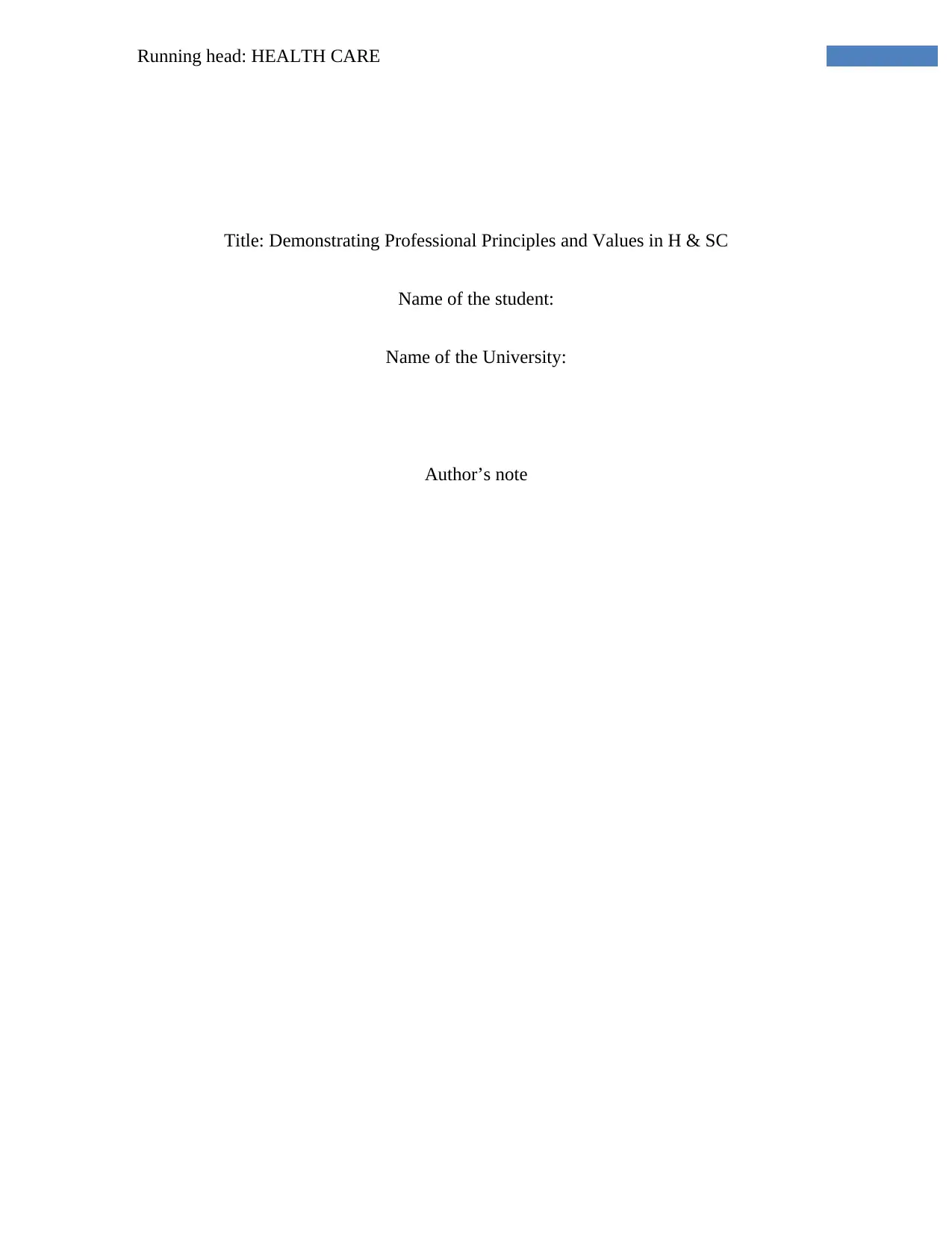
Running head: HEALTH CARE
Title: Demonstrating Professional Principles and Values in H & SC
Name of the student:
Name of the University:
Author’s note
Title: Demonstrating Professional Principles and Values in H & SC
Name of the student:
Name of the University:
Author’s note
Paraphrase This Document
Need a fresh take? Get an instant paraphrase of this document with our AI Paraphraser
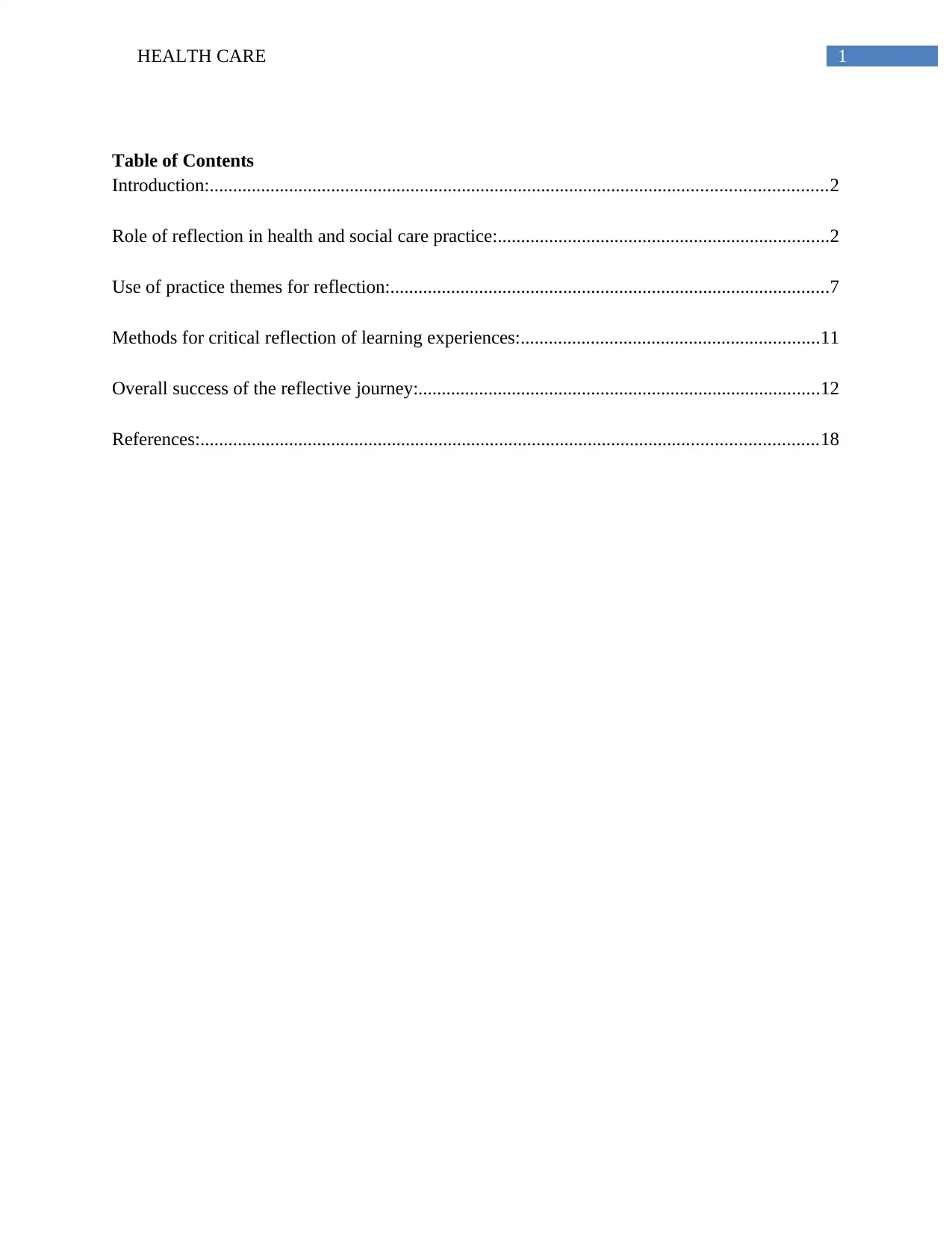
1HEALTH CARE
Table of Contents
Introduction:....................................................................................................................................2
Role of reflection in health and social care practice:.......................................................................2
Use of practice themes for reflection:..............................................................................................7
Methods for critical reflection of learning experiences:................................................................11
Overall success of the reflective journey:......................................................................................12
References:....................................................................................................................................18
Table of Contents
Introduction:....................................................................................................................................2
Role of reflection in health and social care practice:.......................................................................2
Use of practice themes for reflection:..............................................................................................7
Methods for critical reflection of learning experiences:................................................................11
Overall success of the reflective journey:......................................................................................12
References:....................................................................................................................................18
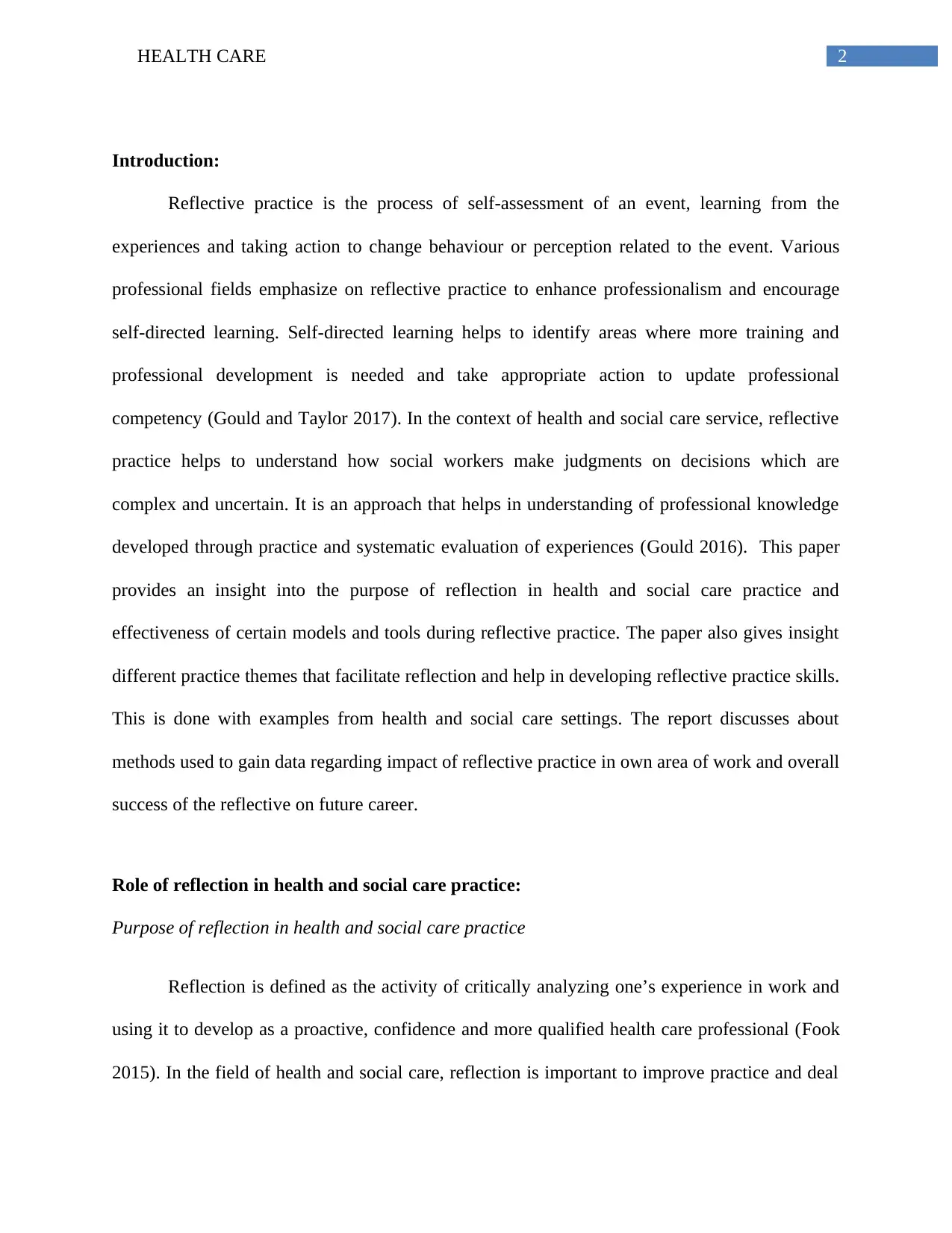
2HEALTH CARE
Introduction:
Reflective practice is the process of self-assessment of an event, learning from the
experiences and taking action to change behaviour or perception related to the event. Various
professional fields emphasize on reflective practice to enhance professionalism and encourage
self-directed learning. Self-directed learning helps to identify areas where more training and
professional development is needed and take appropriate action to update professional
competency (Gould and Taylor 2017). In the context of health and social care service, reflective
practice helps to understand how social workers make judgments on decisions which are
complex and uncertain. It is an approach that helps in understanding of professional knowledge
developed through practice and systematic evaluation of experiences (Gould 2016). This paper
provides an insight into the purpose of reflection in health and social care practice and
effectiveness of certain models and tools during reflective practice. The paper also gives insight
different practice themes that facilitate reflection and help in developing reflective practice skills.
This is done with examples from health and social care settings. The report discusses about
methods used to gain data regarding impact of reflective practice in own area of work and overall
success of the reflective on future career.
Role of reflection in health and social care practice:
Purpose of reflection in health and social care practice
Reflection is defined as the activity of critically analyzing one’s experience in work and
using it to develop as a proactive, confidence and more qualified health care professional (Fook
2015). In the field of health and social care, reflection is important to improve practice and deal
Introduction:
Reflective practice is the process of self-assessment of an event, learning from the
experiences and taking action to change behaviour or perception related to the event. Various
professional fields emphasize on reflective practice to enhance professionalism and encourage
self-directed learning. Self-directed learning helps to identify areas where more training and
professional development is needed and take appropriate action to update professional
competency (Gould and Taylor 2017). In the context of health and social care service, reflective
practice helps to understand how social workers make judgments on decisions which are
complex and uncertain. It is an approach that helps in understanding of professional knowledge
developed through practice and systematic evaluation of experiences (Gould 2016). This paper
provides an insight into the purpose of reflection in health and social care practice and
effectiveness of certain models and tools during reflective practice. The paper also gives insight
different practice themes that facilitate reflection and help in developing reflective practice skills.
This is done with examples from health and social care settings. The report discusses about
methods used to gain data regarding impact of reflective practice in own area of work and overall
success of the reflective on future career.
Role of reflection in health and social care practice:
Purpose of reflection in health and social care practice
Reflection is defined as the activity of critically analyzing one’s experience in work and
using it to develop as a proactive, confidence and more qualified health care professional (Fook
2015). In the field of health and social care, reflection is important to improve practice and deal
⊘ This is a preview!⊘
Do you want full access?
Subscribe today to unlock all pages.

Trusted by 1+ million students worldwide
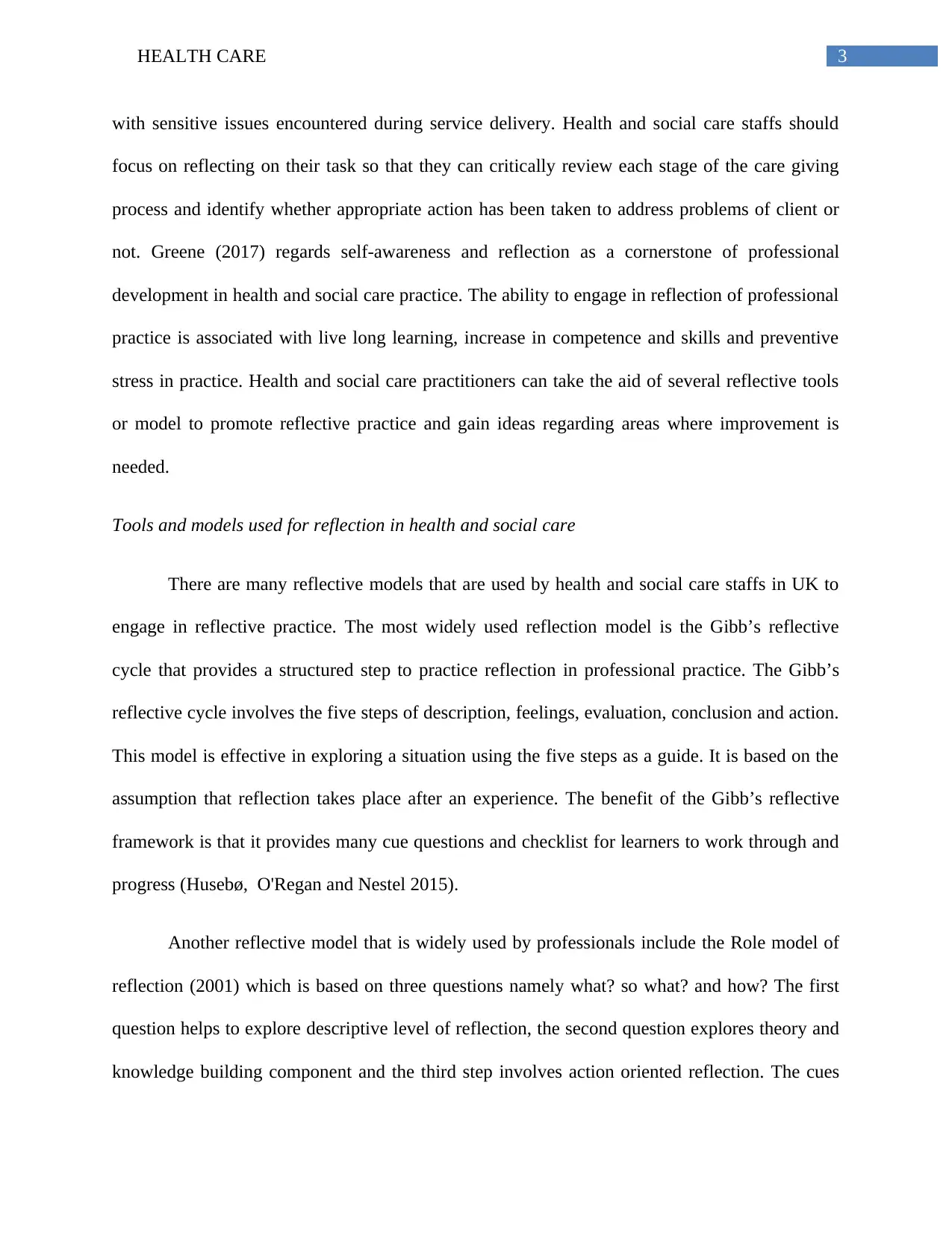
3HEALTH CARE
with sensitive issues encountered during service delivery. Health and social care staffs should
focus on reflecting on their task so that they can critically review each stage of the care giving
process and identify whether appropriate action has been taken to address problems of client or
not. Greene (2017) regards self-awareness and reflection as a cornerstone of professional
development in health and social care practice. The ability to engage in reflection of professional
practice is associated with live long learning, increase in competence and skills and preventive
stress in practice. Health and social care practitioners can take the aid of several reflective tools
or model to promote reflective practice and gain ideas regarding areas where improvement is
needed.
Tools and models used for reflection in health and social care
There are many reflective models that are used by health and social care staffs in UK to
engage in reflective practice. The most widely used reflection model is the Gibb’s reflective
cycle that provides a structured step to practice reflection in professional practice. The Gibb’s
reflective cycle involves the five steps of description, feelings, evaluation, conclusion and action.
This model is effective in exploring a situation using the five steps as a guide. It is based on the
assumption that reflection takes place after an experience. The benefit of the Gibb’s reflective
framework is that it provides many cue questions and checklist for learners to work through and
progress (Husebø, O'Regan and Nestel 2015).
Another reflective model that is widely used by professionals include the Role model of
reflection (2001) which is based on three questions namely what? so what? and how? The first
question helps to explore descriptive level of reflection, the second question explores theory and
knowledge building component and the third step involves action oriented reflection. The cues
with sensitive issues encountered during service delivery. Health and social care staffs should
focus on reflecting on their task so that they can critically review each stage of the care giving
process and identify whether appropriate action has been taken to address problems of client or
not. Greene (2017) regards self-awareness and reflection as a cornerstone of professional
development in health and social care practice. The ability to engage in reflection of professional
practice is associated with live long learning, increase in competence and skills and preventive
stress in practice. Health and social care practitioners can take the aid of several reflective tools
or model to promote reflective practice and gain ideas regarding areas where improvement is
needed.
Tools and models used for reflection in health and social care
There are many reflective models that are used by health and social care staffs in UK to
engage in reflective practice. The most widely used reflection model is the Gibb’s reflective
cycle that provides a structured step to practice reflection in professional practice. The Gibb’s
reflective cycle involves the five steps of description, feelings, evaluation, conclusion and action.
This model is effective in exploring a situation using the five steps as a guide. It is based on the
assumption that reflection takes place after an experience. The benefit of the Gibb’s reflective
framework is that it provides many cue questions and checklist for learners to work through and
progress (Husebø, O'Regan and Nestel 2015).
Another reflective model that is widely used by professionals include the Role model of
reflection (2001) which is based on three questions namely what? so what? and how? The first
question helps to explore descriptive level of reflection, the second question explores theory and
knowledge building component and the third step involves action oriented reflection. The cues
Paraphrase This Document
Need a fresh take? Get an instant paraphrase of this document with our AI Paraphraser
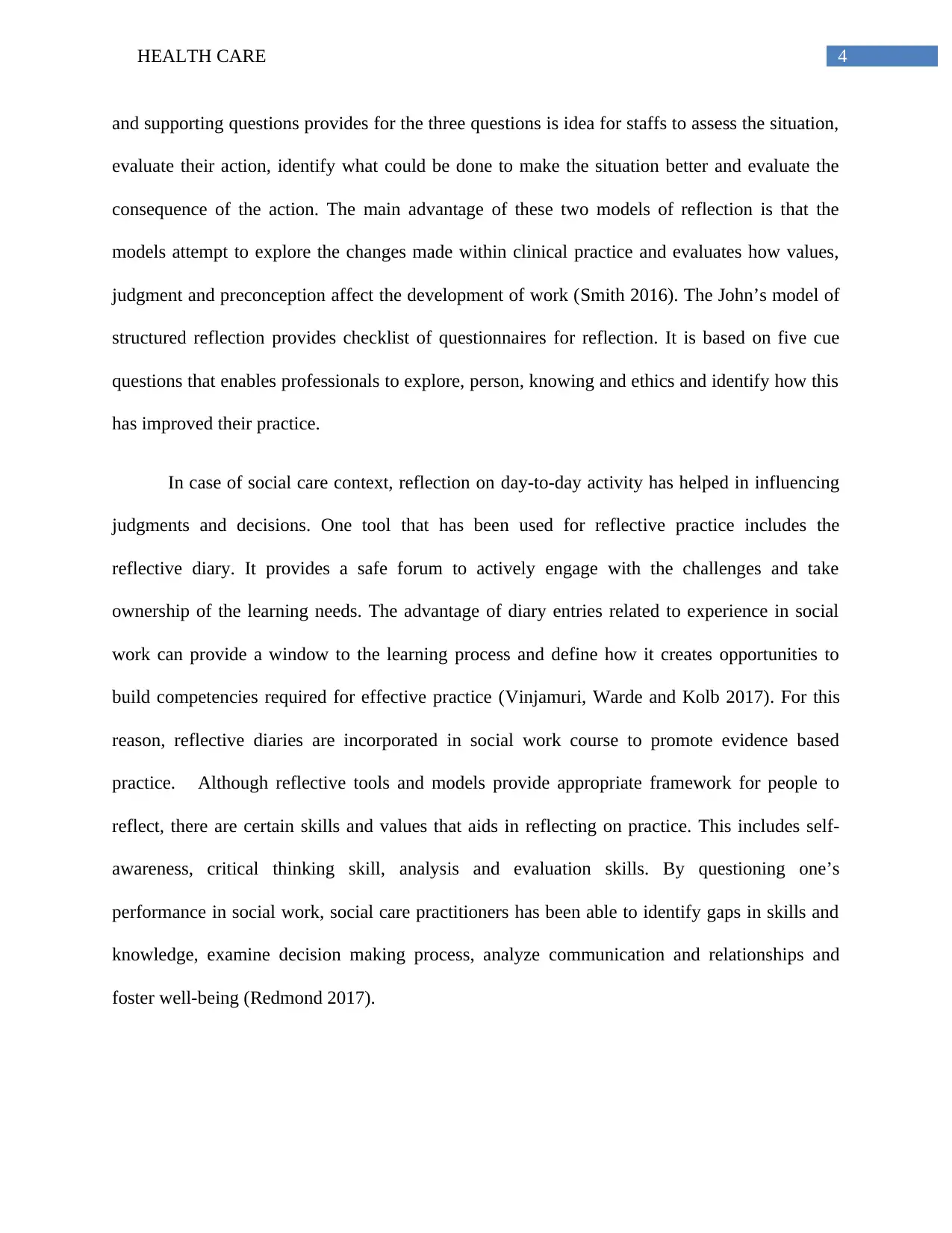
4HEALTH CARE
and supporting questions provides for the three questions is idea for staffs to assess the situation,
evaluate their action, identify what could be done to make the situation better and evaluate the
consequence of the action. The main advantage of these two models of reflection is that the
models attempt to explore the changes made within clinical practice and evaluates how values,
judgment and preconception affect the development of work (Smith 2016). The John’s model of
structured reflection provides checklist of questionnaires for reflection. It is based on five cue
questions that enables professionals to explore, person, knowing and ethics and identify how this
has improved their practice.
In case of social care context, reflection on day-to-day activity has helped in influencing
judgments and decisions. One tool that has been used for reflective practice includes the
reflective diary. It provides a safe forum to actively engage with the challenges and take
ownership of the learning needs. The advantage of diary entries related to experience in social
work can provide a window to the learning process and define how it creates opportunities to
build competencies required for effective practice (Vinjamuri, Warde and Kolb 2017). For this
reason, reflective diaries are incorporated in social work course to promote evidence based
practice. Although reflective tools and models provide appropriate framework for people to
reflect, there are certain skills and values that aids in reflecting on practice. This includes self-
awareness, critical thinking skill, analysis and evaluation skills. By questioning one’s
performance in social work, social care practitioners has been able to identify gaps in skills and
knowledge, examine decision making process, analyze communication and relationships and
foster well-being (Redmond 2017).
and supporting questions provides for the three questions is idea for staffs to assess the situation,
evaluate their action, identify what could be done to make the situation better and evaluate the
consequence of the action. The main advantage of these two models of reflection is that the
models attempt to explore the changes made within clinical practice and evaluates how values,
judgment and preconception affect the development of work (Smith 2016). The John’s model of
structured reflection provides checklist of questionnaires for reflection. It is based on five cue
questions that enables professionals to explore, person, knowing and ethics and identify how this
has improved their practice.
In case of social care context, reflection on day-to-day activity has helped in influencing
judgments and decisions. One tool that has been used for reflective practice includes the
reflective diary. It provides a safe forum to actively engage with the challenges and take
ownership of the learning needs. The advantage of diary entries related to experience in social
work can provide a window to the learning process and define how it creates opportunities to
build competencies required for effective practice (Vinjamuri, Warde and Kolb 2017). For this
reason, reflective diaries are incorporated in social work course to promote evidence based
practice. Although reflective tools and models provide appropriate framework for people to
reflect, there are certain skills and values that aids in reflecting on practice. This includes self-
awareness, critical thinking skill, analysis and evaluation skills. By questioning one’s
performance in social work, social care practitioners has been able to identify gaps in skills and
knowledge, examine decision making process, analyze communication and relationships and
foster well-being (Redmond 2017).
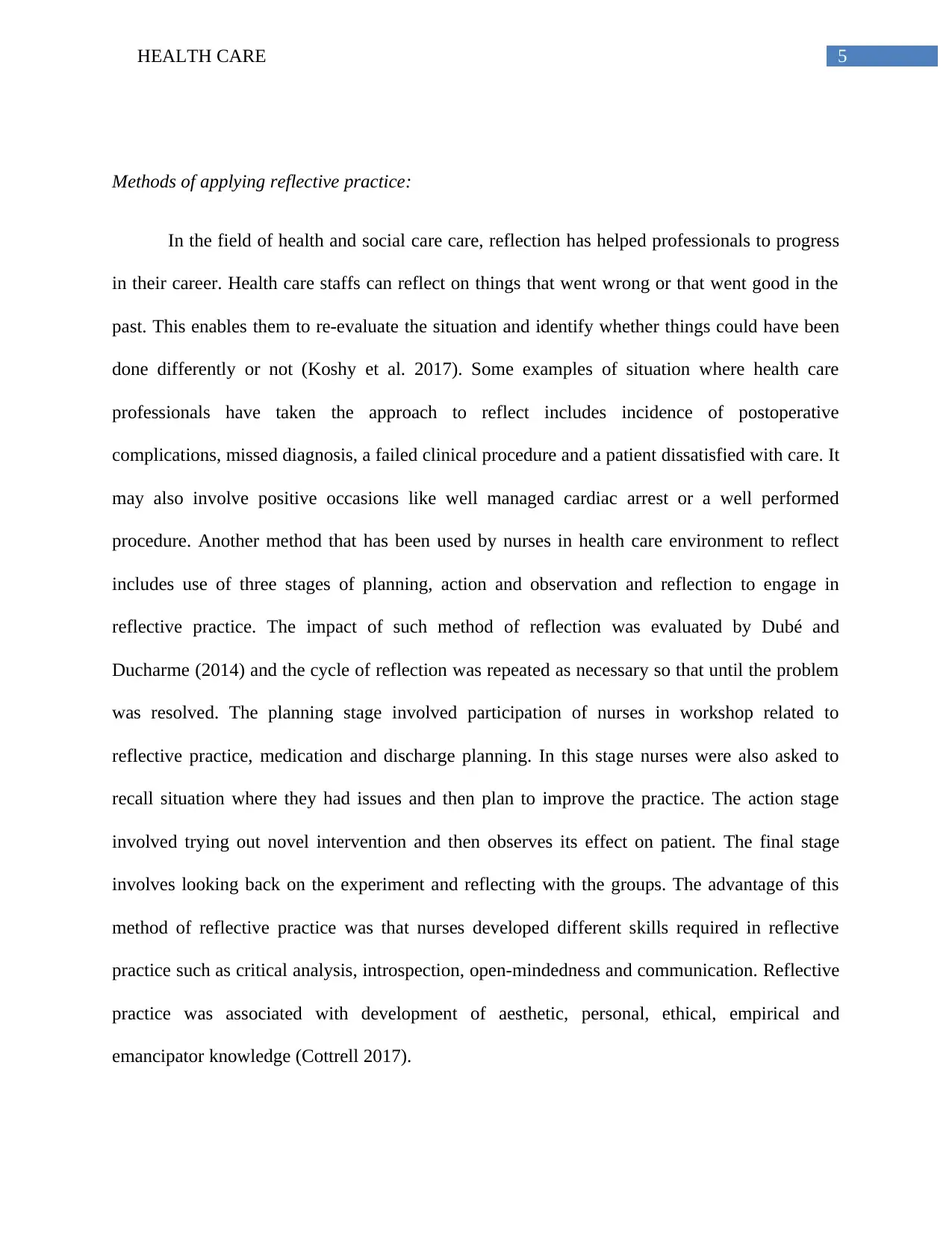
5HEALTH CARE
Methods of applying reflective practice:
In the field of health and social care care, reflection has helped professionals to progress
in their career. Health care staffs can reflect on things that went wrong or that went good in the
past. This enables them to re-evaluate the situation and identify whether things could have been
done differently or not (Koshy et al. 2017). Some examples of situation where health care
professionals have taken the approach to reflect includes incidence of postoperative
complications, missed diagnosis, a failed clinical procedure and a patient dissatisfied with care. It
may also involve positive occasions like well managed cardiac arrest or a well performed
procedure. Another method that has been used by nurses in health care environment to reflect
includes use of three stages of planning, action and observation and reflection to engage in
reflective practice. The impact of such method of reflection was evaluated by Dubé and
Ducharme (2014) and the cycle of reflection was repeated as necessary so that until the problem
was resolved. The planning stage involved participation of nurses in workshop related to
reflective practice, medication and discharge planning. In this stage nurses were also asked to
recall situation where they had issues and then plan to improve the practice. The action stage
involved trying out novel intervention and then observes its effect on patient. The final stage
involves looking back on the experiment and reflecting with the groups. The advantage of this
method of reflective practice was that nurses developed different skills required in reflective
practice such as critical analysis, introspection, open-mindedness and communication. Reflective
practice was associated with development of aesthetic, personal, ethical, empirical and
emancipator knowledge (Cottrell 2017).
Methods of applying reflective practice:
In the field of health and social care care, reflection has helped professionals to progress
in their career. Health care staffs can reflect on things that went wrong or that went good in the
past. This enables them to re-evaluate the situation and identify whether things could have been
done differently or not (Koshy et al. 2017). Some examples of situation where health care
professionals have taken the approach to reflect includes incidence of postoperative
complications, missed diagnosis, a failed clinical procedure and a patient dissatisfied with care. It
may also involve positive occasions like well managed cardiac arrest or a well performed
procedure. Another method that has been used by nurses in health care environment to reflect
includes use of three stages of planning, action and observation and reflection to engage in
reflective practice. The impact of such method of reflection was evaluated by Dubé and
Ducharme (2014) and the cycle of reflection was repeated as necessary so that until the problem
was resolved. The planning stage involved participation of nurses in workshop related to
reflective practice, medication and discharge planning. In this stage nurses were also asked to
recall situation where they had issues and then plan to improve the practice. The action stage
involved trying out novel intervention and then observes its effect on patient. The final stage
involves looking back on the experiment and reflecting with the groups. The advantage of this
method of reflective practice was that nurses developed different skills required in reflective
practice such as critical analysis, introspection, open-mindedness and communication. Reflective
practice was associated with development of aesthetic, personal, ethical, empirical and
emancipator knowledge (Cottrell 2017).
⊘ This is a preview!⊘
Do you want full access?
Subscribe today to unlock all pages.

Trusted by 1+ million students worldwide
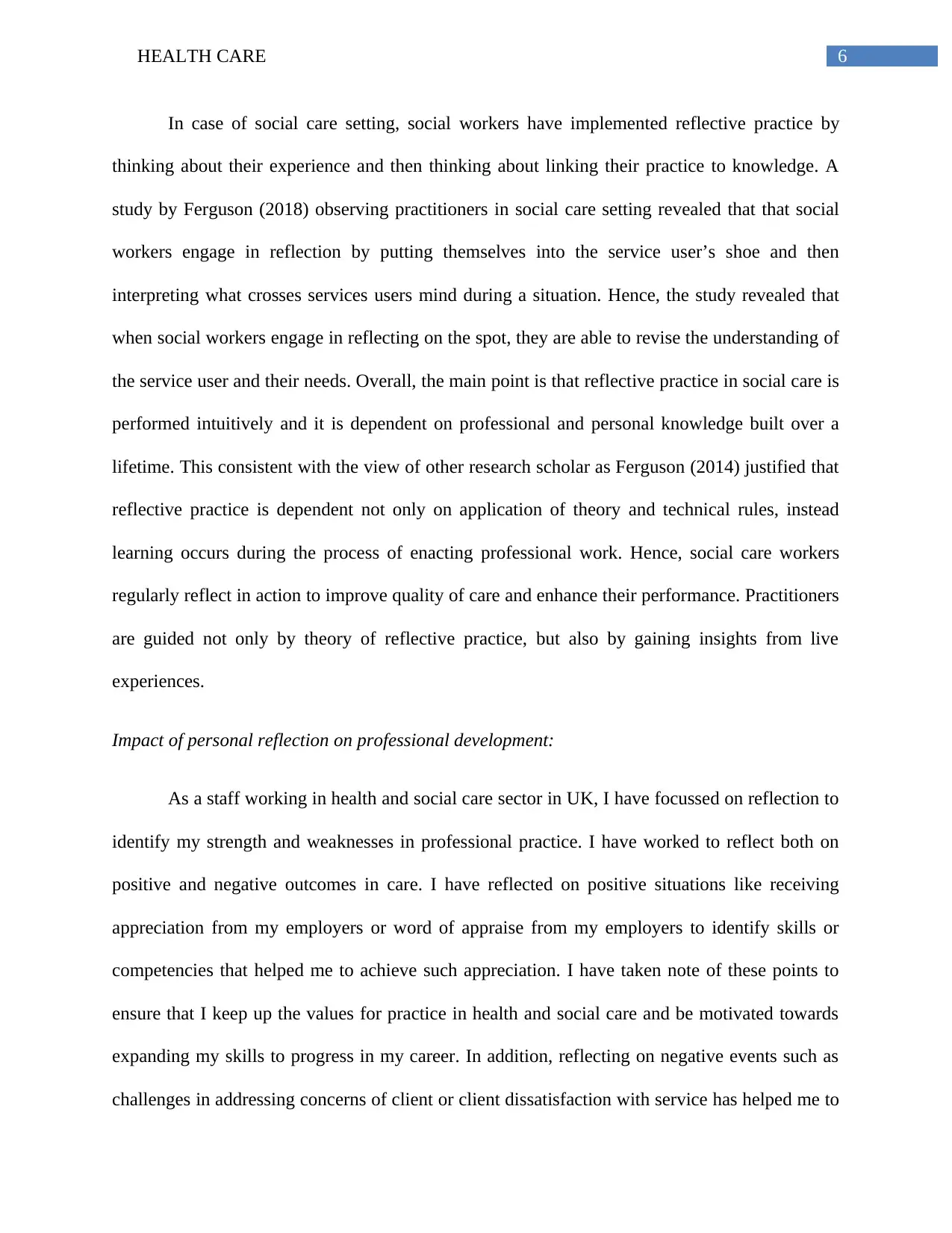
6HEALTH CARE
In case of social care setting, social workers have implemented reflective practice by
thinking about their experience and then thinking about linking their practice to knowledge. A
study by Ferguson (2018) observing practitioners in social care setting revealed that that social
workers engage in reflection by putting themselves into the service user’s shoe and then
interpreting what crosses services users mind during a situation. Hence, the study revealed that
when social workers engage in reflecting on the spot, they are able to revise the understanding of
the service user and their needs. Overall, the main point is that reflective practice in social care is
performed intuitively and it is dependent on professional and personal knowledge built over a
lifetime. This consistent with the view of other research scholar as Ferguson (2014) justified that
reflective practice is dependent not only on application of theory and technical rules, instead
learning occurs during the process of enacting professional work. Hence, social care workers
regularly reflect in action to improve quality of care and enhance their performance. Practitioners
are guided not only by theory of reflective practice, but also by gaining insights from live
experiences.
Impact of personal reflection on professional development:
As a staff working in health and social care sector in UK, I have focussed on reflection to
identify my strength and weaknesses in professional practice. I have worked to reflect both on
positive and negative outcomes in care. I have reflected on positive situations like receiving
appreciation from my employers or word of appraise from my employers to identify skills or
competencies that helped me to achieve such appreciation. I have taken note of these points to
ensure that I keep up the values for practice in health and social care and be motivated towards
expanding my skills to progress in my career. In addition, reflecting on negative events such as
challenges in addressing concerns of client or client dissatisfaction with service has helped me to
In case of social care setting, social workers have implemented reflective practice by
thinking about their experience and then thinking about linking their practice to knowledge. A
study by Ferguson (2018) observing practitioners in social care setting revealed that that social
workers engage in reflection by putting themselves into the service user’s shoe and then
interpreting what crosses services users mind during a situation. Hence, the study revealed that
when social workers engage in reflecting on the spot, they are able to revise the understanding of
the service user and their needs. Overall, the main point is that reflective practice in social care is
performed intuitively and it is dependent on professional and personal knowledge built over a
lifetime. This consistent with the view of other research scholar as Ferguson (2014) justified that
reflective practice is dependent not only on application of theory and technical rules, instead
learning occurs during the process of enacting professional work. Hence, social care workers
regularly reflect in action to improve quality of care and enhance their performance. Practitioners
are guided not only by theory of reflective practice, but also by gaining insights from live
experiences.
Impact of personal reflection on professional development:
As a staff working in health and social care sector in UK, I have focussed on reflection to
identify my strength and weaknesses in professional practice. I have worked to reflect both on
positive and negative outcomes in care. I have reflected on positive situations like receiving
appreciation from my employers or word of appraise from my employers to identify skills or
competencies that helped me to achieve such appreciation. I have taken note of these points to
ensure that I keep up the values for practice in health and social care and be motivated towards
expanding my skills to progress in my career. In addition, reflecting on negative events such as
challenges in addressing concerns of client or client dissatisfaction with service has helped me to
Paraphrase This Document
Need a fresh take? Get an instant paraphrase of this document with our AI Paraphraser
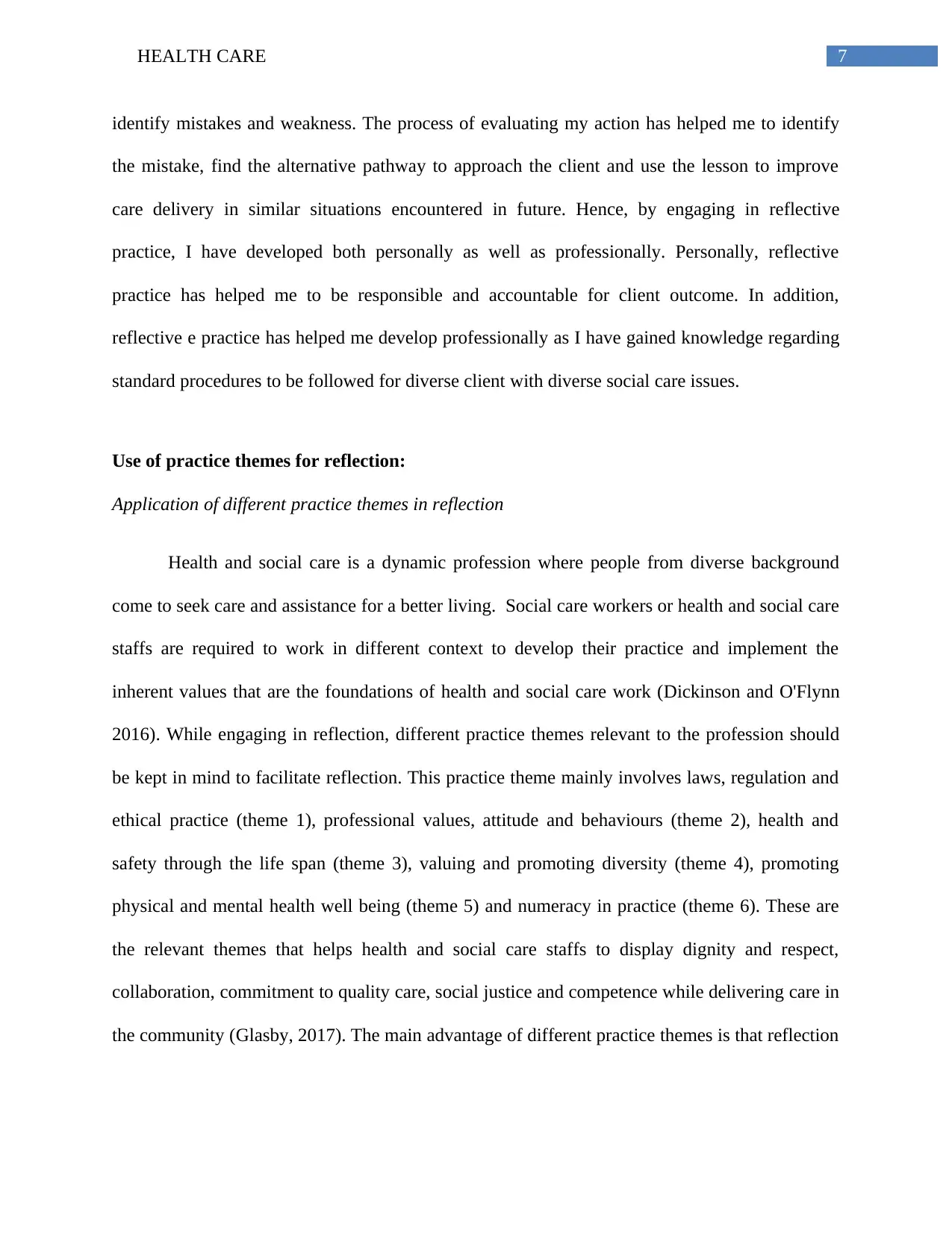
7HEALTH CARE
identify mistakes and weakness. The process of evaluating my action has helped me to identify
the mistake, find the alternative pathway to approach the client and use the lesson to improve
care delivery in similar situations encountered in future. Hence, by engaging in reflective
practice, I have developed both personally as well as professionally. Personally, reflective
practice has helped me to be responsible and accountable for client outcome. In addition,
reflective e practice has helped me develop professionally as I have gained knowledge regarding
standard procedures to be followed for diverse client with diverse social care issues.
Use of practice themes for reflection:
Application of different practice themes in reflection
Health and social care is a dynamic profession where people from diverse background
come to seek care and assistance for a better living. Social care workers or health and social care
staffs are required to work in different context to develop their practice and implement the
inherent values that are the foundations of health and social care work (Dickinson and O'Flynn
2016). While engaging in reflection, different practice themes relevant to the profession should
be kept in mind to facilitate reflection. This practice theme mainly involves laws, regulation and
ethical practice (theme 1), professional values, attitude and behaviours (theme 2), health and
safety through the life span (theme 3), valuing and promoting diversity (theme 4), promoting
physical and mental health well being (theme 5) and numeracy in practice (theme 6). These are
the relevant themes that helps health and social care staffs to display dignity and respect,
collaboration, commitment to quality care, social justice and competence while delivering care in
the community (Glasby, 2017). The main advantage of different practice themes is that reflection
identify mistakes and weakness. The process of evaluating my action has helped me to identify
the mistake, find the alternative pathway to approach the client and use the lesson to improve
care delivery in similar situations encountered in future. Hence, by engaging in reflective
practice, I have developed both personally as well as professionally. Personally, reflective
practice has helped me to be responsible and accountable for client outcome. In addition,
reflective e practice has helped me develop professionally as I have gained knowledge regarding
standard procedures to be followed for diverse client with diverse social care issues.
Use of practice themes for reflection:
Application of different practice themes in reflection
Health and social care is a dynamic profession where people from diverse background
come to seek care and assistance for a better living. Social care workers or health and social care
staffs are required to work in different context to develop their practice and implement the
inherent values that are the foundations of health and social care work (Dickinson and O'Flynn
2016). While engaging in reflection, different practice themes relevant to the profession should
be kept in mind to facilitate reflection. This practice theme mainly involves laws, regulation and
ethical practice (theme 1), professional values, attitude and behaviours (theme 2), health and
safety through the life span (theme 3), valuing and promoting diversity (theme 4), promoting
physical and mental health well being (theme 5) and numeracy in practice (theme 6). These are
the relevant themes that helps health and social care staffs to display dignity and respect,
collaboration, commitment to quality care, social justice and competence while delivering care in
the community (Glasby, 2017). The main advantage of different practice themes is that reflection
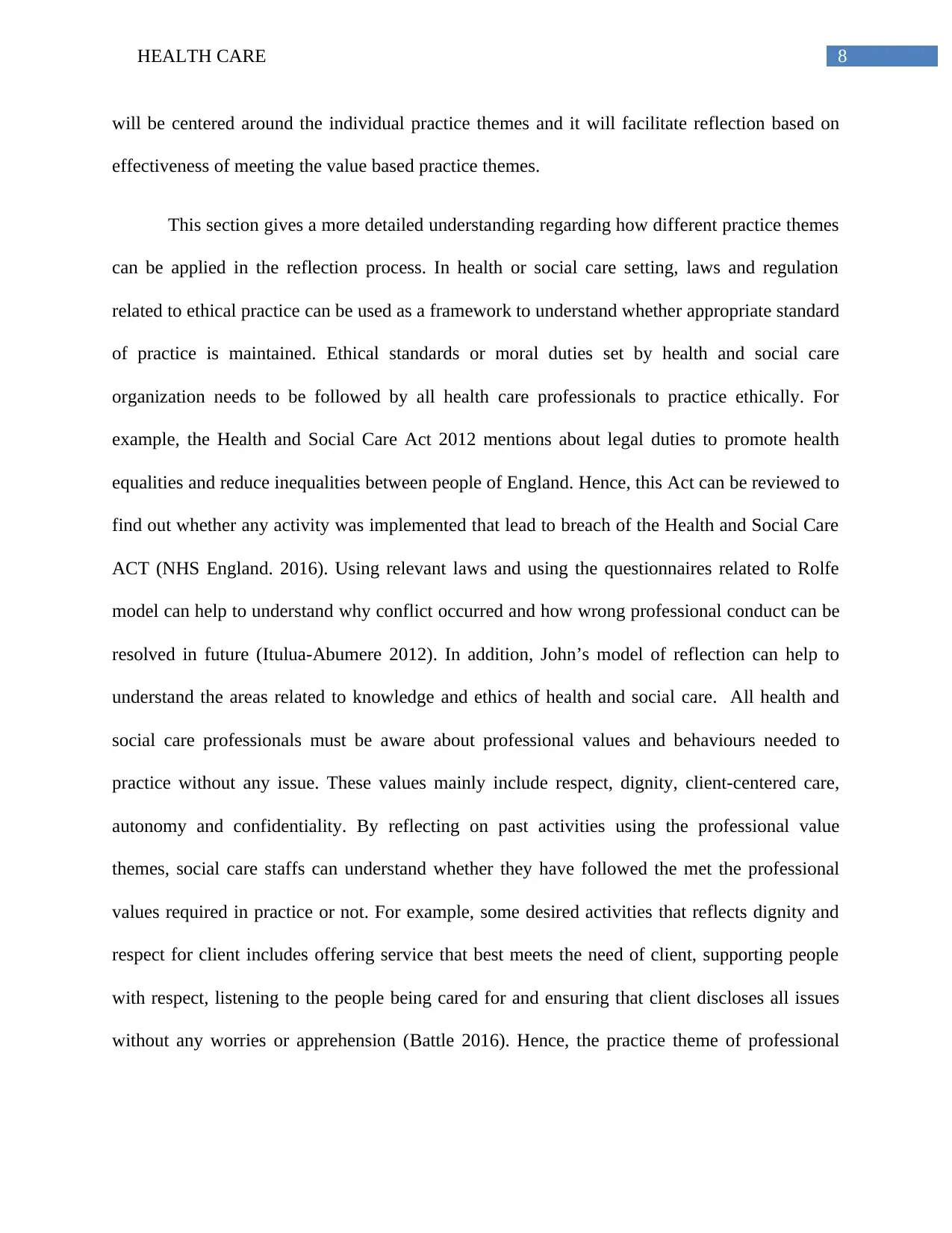
8HEALTH CARE
will be centered around the individual practice themes and it will facilitate reflection based on
effectiveness of meeting the value based practice themes.
This section gives a more detailed understanding regarding how different practice themes
can be applied in the reflection process. In health or social care setting, laws and regulation
related to ethical practice can be used as a framework to understand whether appropriate standard
of practice is maintained. Ethical standards or moral duties set by health and social care
organization needs to be followed by all health care professionals to practice ethically. For
example, the Health and Social Care Act 2012 mentions about legal duties to promote health
equalities and reduce inequalities between people of England. Hence, this Act can be reviewed to
find out whether any activity was implemented that lead to breach of the Health and Social Care
ACT (NHS England. 2016). Using relevant laws and using the questionnaires related to Rolfe
model can help to understand why conflict occurred and how wrong professional conduct can be
resolved in future (Itulua-Abumere 2012). In addition, John’s model of reflection can help to
understand the areas related to knowledge and ethics of health and social care. All health and
social care professionals must be aware about professional values and behaviours needed to
practice without any issue. These values mainly include respect, dignity, client-centered care,
autonomy and confidentiality. By reflecting on past activities using the professional value
themes, social care staffs can understand whether they have followed the met the professional
values required in practice or not. For example, some desired activities that reflects dignity and
respect for client includes offering service that best meets the need of client, supporting people
with respect, listening to the people being cared for and ensuring that client discloses all issues
without any worries or apprehension (Battle 2016). Hence, the practice theme of professional
will be centered around the individual practice themes and it will facilitate reflection based on
effectiveness of meeting the value based practice themes.
This section gives a more detailed understanding regarding how different practice themes
can be applied in the reflection process. In health or social care setting, laws and regulation
related to ethical practice can be used as a framework to understand whether appropriate standard
of practice is maintained. Ethical standards or moral duties set by health and social care
organization needs to be followed by all health care professionals to practice ethically. For
example, the Health and Social Care Act 2012 mentions about legal duties to promote health
equalities and reduce inequalities between people of England. Hence, this Act can be reviewed to
find out whether any activity was implemented that lead to breach of the Health and Social Care
ACT (NHS England. 2016). Using relevant laws and using the questionnaires related to Rolfe
model can help to understand why conflict occurred and how wrong professional conduct can be
resolved in future (Itulua-Abumere 2012). In addition, John’s model of reflection can help to
understand the areas related to knowledge and ethics of health and social care. All health and
social care professionals must be aware about professional values and behaviours needed to
practice without any issue. These values mainly include respect, dignity, client-centered care,
autonomy and confidentiality. By reflecting on past activities using the professional value
themes, social care staffs can understand whether they have followed the met the professional
values required in practice or not. For example, some desired activities that reflects dignity and
respect for client includes offering service that best meets the need of client, supporting people
with respect, listening to the people being cared for and ensuring that client discloses all issues
without any worries or apprehension (Battle 2016). Hence, the practice theme of professional
⊘ This is a preview!⊘
Do you want full access?
Subscribe today to unlock all pages.

Trusted by 1+ million students worldwide
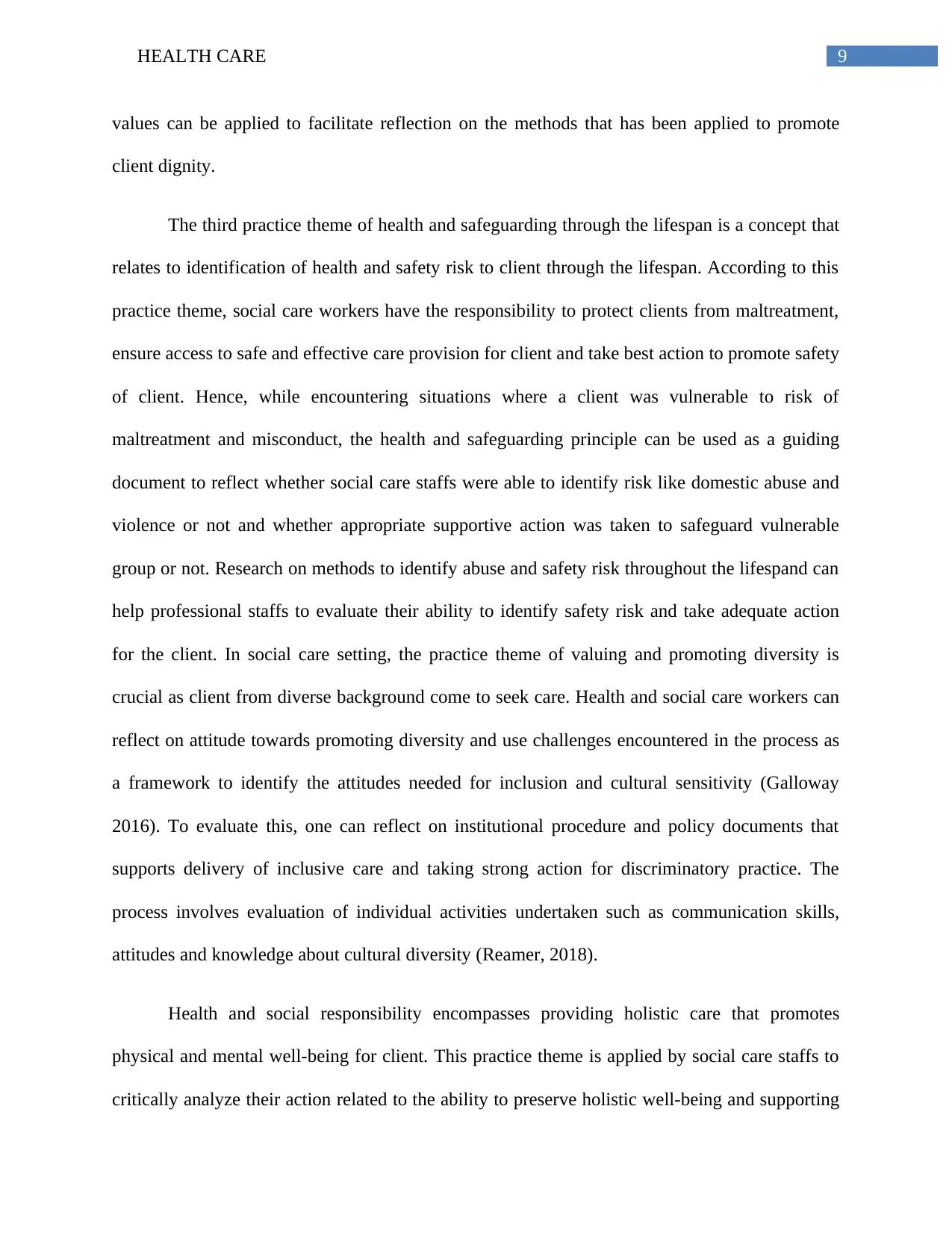
9HEALTH CARE
values can be applied to facilitate reflection on the methods that has been applied to promote
client dignity.
The third practice theme of health and safeguarding through the lifespan is a concept that
relates to identification of health and safety risk to client through the lifespan. According to this
practice theme, social care workers have the responsibility to protect clients from maltreatment,
ensure access to safe and effective care provision for client and take best action to promote safety
of client. Hence, while encountering situations where a client was vulnerable to risk of
maltreatment and misconduct, the health and safeguarding principle can be used as a guiding
document to reflect whether social care staffs were able to identify risk like domestic abuse and
violence or not and whether appropriate supportive action was taken to safeguard vulnerable
group or not. Research on methods to identify abuse and safety risk throughout the lifespand can
help professional staffs to evaluate their ability to identify safety risk and take adequate action
for the client. In social care setting, the practice theme of valuing and promoting diversity is
crucial as client from diverse background come to seek care. Health and social care workers can
reflect on attitude towards promoting diversity and use challenges encountered in the process as
a framework to identify the attitudes needed for inclusion and cultural sensitivity (Galloway
2016). To evaluate this, one can reflect on institutional procedure and policy documents that
supports delivery of inclusive care and taking strong action for discriminatory practice. The
process involves evaluation of individual activities undertaken such as communication skills,
attitudes and knowledge about cultural diversity (Reamer, 2018).
Health and social responsibility encompasses providing holistic care that promotes
physical and mental well-being for client. This practice theme is applied by social care staffs to
critically analyze their action related to the ability to preserve holistic well-being and supporting
values can be applied to facilitate reflection on the methods that has been applied to promote
client dignity.
The third practice theme of health and safeguarding through the lifespan is a concept that
relates to identification of health and safety risk to client through the lifespan. According to this
practice theme, social care workers have the responsibility to protect clients from maltreatment,
ensure access to safe and effective care provision for client and take best action to promote safety
of client. Hence, while encountering situations where a client was vulnerable to risk of
maltreatment and misconduct, the health and safeguarding principle can be used as a guiding
document to reflect whether social care staffs were able to identify risk like domestic abuse and
violence or not and whether appropriate supportive action was taken to safeguard vulnerable
group or not. Research on methods to identify abuse and safety risk throughout the lifespand can
help professional staffs to evaluate their ability to identify safety risk and take adequate action
for the client. In social care setting, the practice theme of valuing and promoting diversity is
crucial as client from diverse background come to seek care. Health and social care workers can
reflect on attitude towards promoting diversity and use challenges encountered in the process as
a framework to identify the attitudes needed for inclusion and cultural sensitivity (Galloway
2016). To evaluate this, one can reflect on institutional procedure and policy documents that
supports delivery of inclusive care and taking strong action for discriminatory practice. The
process involves evaluation of individual activities undertaken such as communication skills,
attitudes and knowledge about cultural diversity (Reamer, 2018).
Health and social responsibility encompasses providing holistic care that promotes
physical and mental well-being for client. This practice theme is applied by social care staffs to
critically analyze their action related to the ability to preserve holistic well-being and supporting
Paraphrase This Document
Need a fresh take? Get an instant paraphrase of this document with our AI Paraphraser
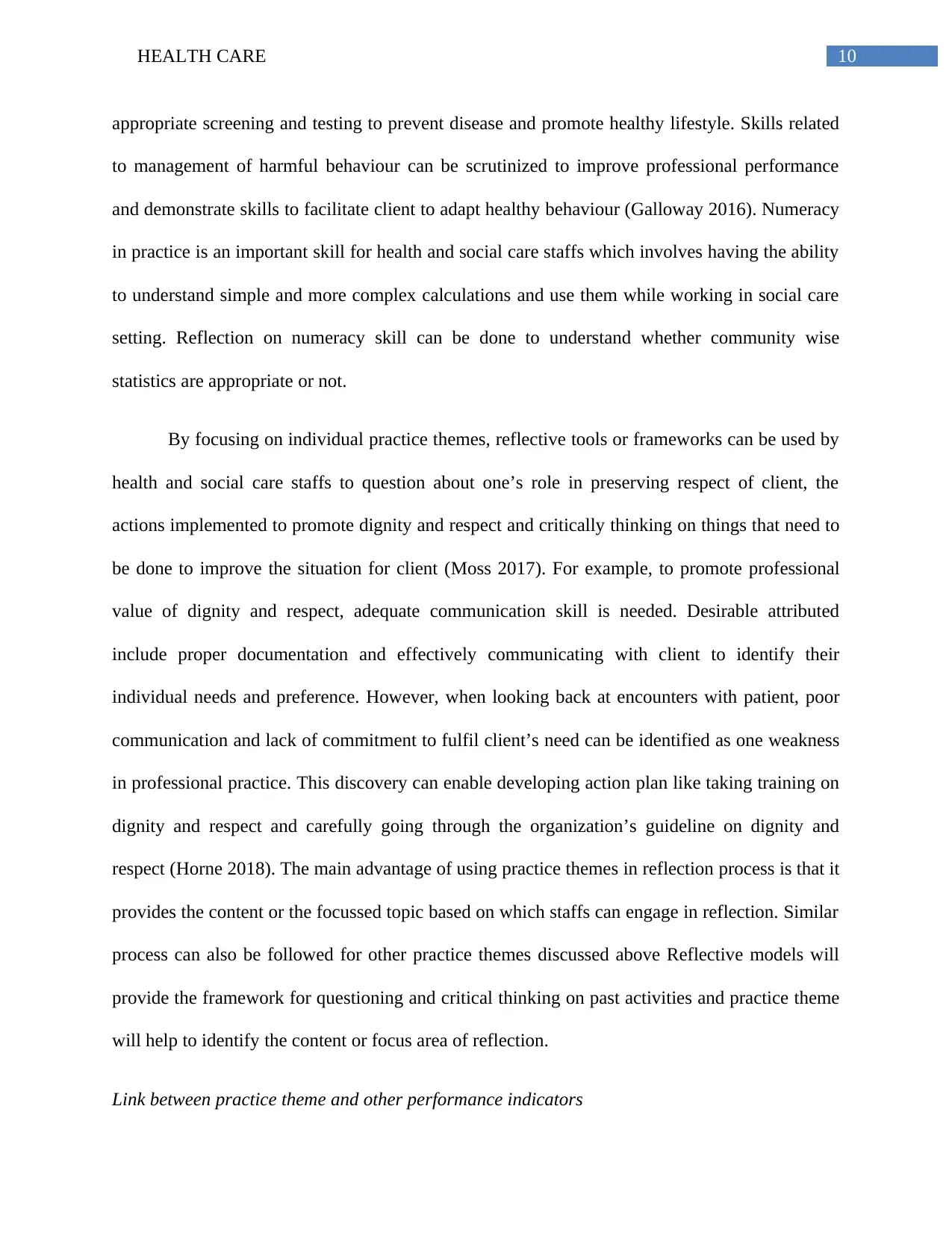
10HEALTH CARE
appropriate screening and testing to prevent disease and promote healthy lifestyle. Skills related
to management of harmful behaviour can be scrutinized to improve professional performance
and demonstrate skills to facilitate client to adapt healthy behaviour (Galloway 2016). Numeracy
in practice is an important skill for health and social care staffs which involves having the ability
to understand simple and more complex calculations and use them while working in social care
setting. Reflection on numeracy skill can be done to understand whether community wise
statistics are appropriate or not.
By focusing on individual practice themes, reflective tools or frameworks can be used by
health and social care staffs to question about one’s role in preserving respect of client, the
actions implemented to promote dignity and respect and critically thinking on things that need to
be done to improve the situation for client (Moss 2017). For example, to promote professional
value of dignity and respect, adequate communication skill is needed. Desirable attributed
include proper documentation and effectively communicating with client to identify their
individual needs and preference. However, when looking back at encounters with patient, poor
communication and lack of commitment to fulfil client’s need can be identified as one weakness
in professional practice. This discovery can enable developing action plan like taking training on
dignity and respect and carefully going through the organization’s guideline on dignity and
respect (Horne 2018). The main advantage of using practice themes in reflection process is that it
provides the content or the focussed topic based on which staffs can engage in reflection. Similar
process can also be followed for other practice themes discussed above Reflective models will
provide the framework for questioning and critical thinking on past activities and practice theme
will help to identify the content or focus area of reflection.
Link between practice theme and other performance indicators
appropriate screening and testing to prevent disease and promote healthy lifestyle. Skills related
to management of harmful behaviour can be scrutinized to improve professional performance
and demonstrate skills to facilitate client to adapt healthy behaviour (Galloway 2016). Numeracy
in practice is an important skill for health and social care staffs which involves having the ability
to understand simple and more complex calculations and use them while working in social care
setting. Reflection on numeracy skill can be done to understand whether community wise
statistics are appropriate or not.
By focusing on individual practice themes, reflective tools or frameworks can be used by
health and social care staffs to question about one’s role in preserving respect of client, the
actions implemented to promote dignity and respect and critically thinking on things that need to
be done to improve the situation for client (Moss 2017). For example, to promote professional
value of dignity and respect, adequate communication skill is needed. Desirable attributed
include proper documentation and effectively communicating with client to identify their
individual needs and preference. However, when looking back at encounters with patient, poor
communication and lack of commitment to fulfil client’s need can be identified as one weakness
in professional practice. This discovery can enable developing action plan like taking training on
dignity and respect and carefully going through the organization’s guideline on dignity and
respect (Horne 2018). The main advantage of using practice themes in reflection process is that it
provides the content or the focussed topic based on which staffs can engage in reflection. Similar
process can also be followed for other practice themes discussed above Reflective models will
provide the framework for questioning and critical thinking on past activities and practice theme
will help to identify the content or focus area of reflection.
Link between practice theme and other performance indicators
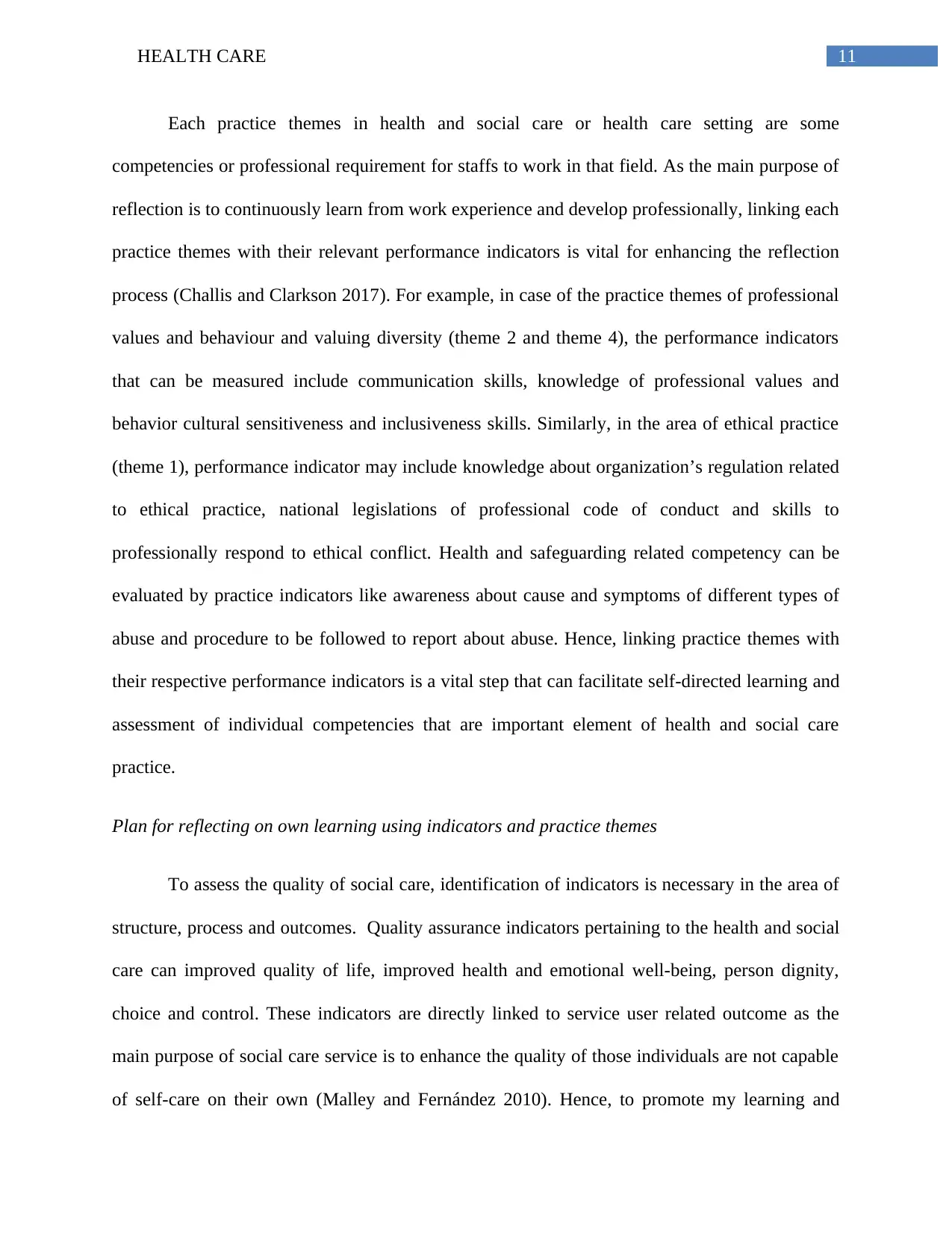
11HEALTH CARE
Each practice themes in health and social care or health care setting are some
competencies or professional requirement for staffs to work in that field. As the main purpose of
reflection is to continuously learn from work experience and develop professionally, linking each
practice themes with their relevant performance indicators is vital for enhancing the reflection
process (Challis and Clarkson 2017). For example, in case of the practice themes of professional
values and behaviour and valuing diversity (theme 2 and theme 4), the performance indicators
that can be measured include communication skills, knowledge of professional values and
behavior cultural sensitiveness and inclusiveness skills. Similarly, in the area of ethical practice
(theme 1), performance indicator may include knowledge about organization’s regulation related
to ethical practice, national legislations of professional code of conduct and skills to
professionally respond to ethical conflict. Health and safeguarding related competency can be
evaluated by practice indicators like awareness about cause and symptoms of different types of
abuse and procedure to be followed to report about abuse. Hence, linking practice themes with
their respective performance indicators is a vital step that can facilitate self-directed learning and
assessment of individual competencies that are important element of health and social care
practice.
Plan for reflecting on own learning using indicators and practice themes
To assess the quality of social care, identification of indicators is necessary in the area of
structure, process and outcomes. Quality assurance indicators pertaining to the health and social
care can improved quality of life, improved health and emotional well-being, person dignity,
choice and control. These indicators are directly linked to service user related outcome as the
main purpose of social care service is to enhance the quality of those individuals are not capable
of self-care on their own (Malley and Fernández 2010). Hence, to promote my learning and
Each practice themes in health and social care or health care setting are some
competencies or professional requirement for staffs to work in that field. As the main purpose of
reflection is to continuously learn from work experience and develop professionally, linking each
practice themes with their relevant performance indicators is vital for enhancing the reflection
process (Challis and Clarkson 2017). For example, in case of the practice themes of professional
values and behaviour and valuing diversity (theme 2 and theme 4), the performance indicators
that can be measured include communication skills, knowledge of professional values and
behavior cultural sensitiveness and inclusiveness skills. Similarly, in the area of ethical practice
(theme 1), performance indicator may include knowledge about organization’s regulation related
to ethical practice, national legislations of professional code of conduct and skills to
professionally respond to ethical conflict. Health and safeguarding related competency can be
evaluated by practice indicators like awareness about cause and symptoms of different types of
abuse and procedure to be followed to report about abuse. Hence, linking practice themes with
their respective performance indicators is a vital step that can facilitate self-directed learning and
assessment of individual competencies that are important element of health and social care
practice.
Plan for reflecting on own learning using indicators and practice themes
To assess the quality of social care, identification of indicators is necessary in the area of
structure, process and outcomes. Quality assurance indicators pertaining to the health and social
care can improved quality of life, improved health and emotional well-being, person dignity,
choice and control. These indicators are directly linked to service user related outcome as the
main purpose of social care service is to enhance the quality of those individuals are not capable
of self-care on their own (Malley and Fernández 2010). Hence, to promote my learning and
⊘ This is a preview!⊘
Do you want full access?
Subscribe today to unlock all pages.

Trusted by 1+ million students worldwide
1 out of 24
Related Documents
Your All-in-One AI-Powered Toolkit for Academic Success.
+13062052269
info@desklib.com
Available 24*7 on WhatsApp / Email
![[object Object]](/_next/static/media/star-bottom.7253800d.svg)
Unlock your academic potential
Copyright © 2020–2026 A2Z Services. All Rights Reserved. Developed and managed by ZUCOL.




